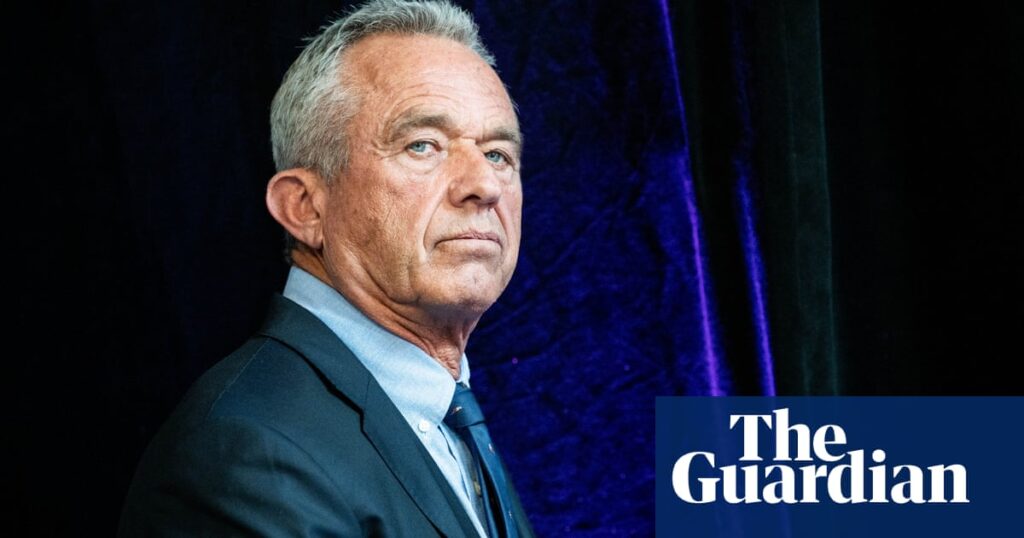Robert F Kennedy Jr, the third-party candidate for US president, said a health problem he experienced in 2010 “was caused by a worm that got into my brain and ate a portion of it and then died”, the New York Times reported.
The startling words were contained in a divorce case deposition from 2012 the Times said it obtained.
Two years before the deposition, the paper said, Kennedy experienced “memory loss and mental fogginess so severe that a friend grew concerned he might have a brain tumour”.
Neurologists who treated Kennedy’s uncle, the Massachusetts senator Ted Kennedy, before his death aged 77 from brain cancer in 2009, told the younger man he had a dark spot on his brain scans, and concluded he too had a tumour.
But, Kennedy reportedly said, a doctor at New York-Presbyterian hospital posited another explanation: a parasite in Kennedy’s brain.
Speaking this winter, the paper said, Kennedy told the Times that at around the same time he learned of the parasite in his brain he was also found to have mercury poisoning, which can cause neurological problems, probably due to eating a lot of fish.
In the 2012 deposition, Kennedy reportedly said: “I have cognitive problems, clearly. I have short-term memory loss, and I have longer-term memory loss that affects me.”
In his recent interview, the Times said, Kennedy said he had recovered from such problems. The paper also said Kennedy’s spokesperson, Stefanie Spear, responded to a question about whether the candidate’s health problems could compromise his fitness to be president by saying: “That is a hilarious suggestion, given the competition.”
Now 70, Kennedy has suffered other issues including a heart problem for which he has been repeatedly hospitalised and spasmodic dysphonia, a neurological condition that affects his voice.
Nonetheless, the scion of a famous political clan – his father was the US attorney general and New York senator Robert F Kennedy, his uncle John F Kennedy, the 35th president – has focused on showing off his physical fitness in contrast to that of Joe Biden, the oldest president ever elected, now 81, and Donald Trump, the 77-year-old Republican challenger.
The Times said Kennedy declined to share his medical records. Biden and Trump have not released theirs in this election cycle.
Observers on the left and right of US politics fear Kennedy’s campaign, which leans into his prominence as a Covid vaccine conspiracy theorist and other outsider positions, could siphon key votes from both Biden and Trump – candidates with whom the public is largely dissatisfied.
Kennedy has gained ballot access or is pursuing it in key states, including by securing nominations from fringe parties. In April, a host of Kennedy family members appeared in Philadelphia to publicly back Biden.
The Times said the 2012 deposition it obtained was given during Kennedy’s divorce from his second wife, Mary Richardson Kennedy.
Kennedy, then an environmental attorney and campaigner, argued that his earning power was diminished by his neurological and cognitive problems, the Times said.
skip past newsletter promotion
Our US morning briefing breaks down the key stories of the day, telling you what’s happening and why it matters
Privacy Notice: Newsletters may contain info about charities, online ads, and content funded by outside parties. For more information see our Privacy Policy. We use Google reCaptcha to protect our website and the Google Privacy Policy and Terms of Service apply.
after newsletter promotion
Doctors eventually concurred that the spot on Kennedy’s brain was the result of a parasite, Kennedy said, according to the Times. Kennedy reportedly said he thought he might have contracted the parasite in southern Asia. The Times said experts who did not treat Kennedy thought the parasite “was likely a pork tapeworm larva”.
“Some tapeworm larvae can live in a human brain for years without causing problems,” the Times said. “Others can wreak havoc, often when they start to die, which causes inflammation. The most common symptoms are seizures, headaches and dizziness.”
But Scott Gardner, curator of the Manter Laboratory for Parasitology at the University of Nebraska-Lincoln, told the paper severe memory loss, as described by Kennedy (who told the Times he experienced “severe brain fog”), was more often associated with mercury poisoning.
In his 2012 deposition, the Times said, Kennedy also discussed his spasmodic dysphonia, which he said had affected his earnings from public speaking.
Kennedy recently told Vladislav “DJ Vlad” Lyubovny, “a Ukrainian-American interviewer, journalist and former DJ”, that last year he went to Kyoto, Japan, “to get a surgery, a procedure … that is not available here in the United States” and which involved putting “a titanium bridge between your vocal chords”.
Kennedy’s deposition also included discussion of his heart problems, which he said began in college, the Times reported.
Saying the condition was triggered by stress, caffeine and sleep deprivation, Kennedy reportedly said: “It feels like there’s a bag of worms in my chest.”

